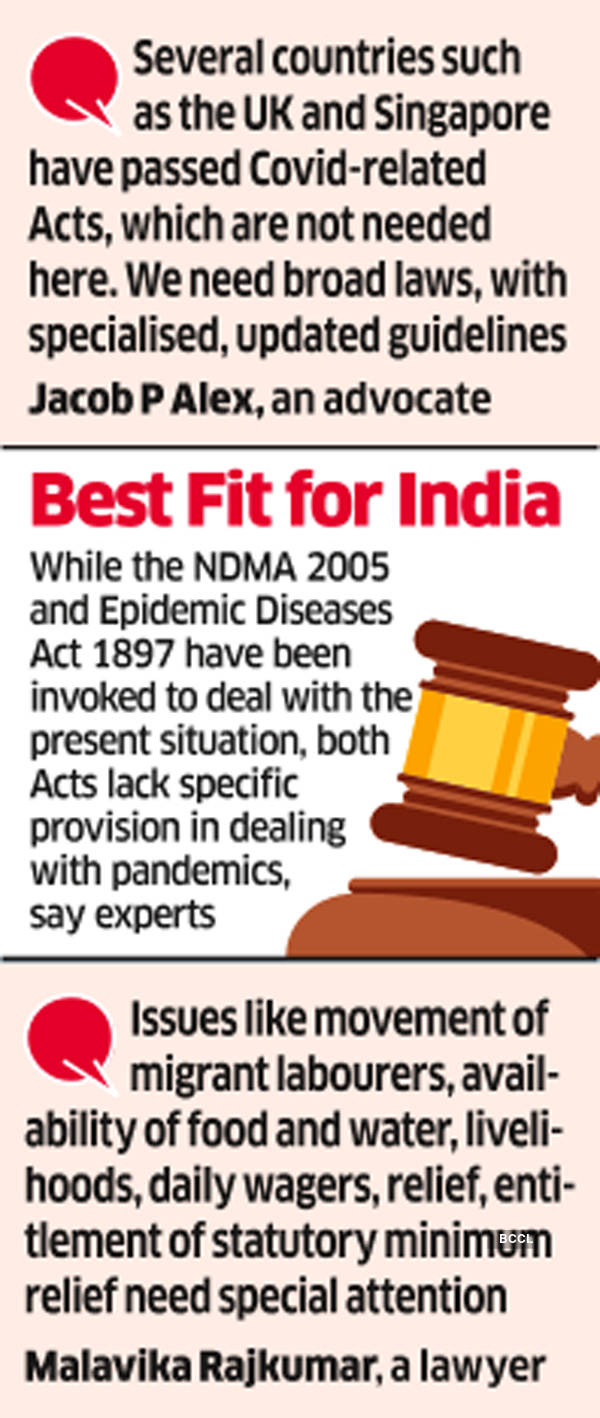NEW DELHI: In a bid to ensure states are better prepared to face future health emergencies, the Fifteenth Finance commission has started looking into the scope and need for expanding the ambit of the country’s laws related to disaster management. It is studying the existing laws to see if they can cover pandemic situations more comprehensively, while making it clear that if new legislation is required, it is up to the home ministry to come up with it and Parliament to take the decision.
Commission chairman NK Singh held a virtual meeting with officials from the Ministry of Home Affairs and the National Disaster Management Authority (NDMA) on Thursday. The objective was to seek feedback on the adequacy of the recommendations on disaster risk management made in the commission’s report for 2020-21, and get suggestions for the next five years with a special focus on Covid-19, officials said.

In an interim report of the commission submitted in February 2020, it had specifically looked at how states could ensure that sufficient funds were kept aside for rehabilitation, mitigation and capacity-building, rather than allocating money for just immediate relief.
The commission had recommended allocation of Rs 28,983 crore to the State Disaster Response Fund, out of which the Centre recently released Rs 11,092 crore as its share of first instalment for 2020-21. The fund, the Centre had said, could be used for cluster containment, quarantine and purchase of personal protective equipment for frontline workers in the fight against Covid-19. The commission is now finalising its recommendations for its report for the next five years, to be submitted before October
“We have started collecting views and getting information on constitutional positions … The DM Act came only in 2005, but it is also the Epidemics Act that enables a lot of action … Our 2021 report that came during the pre-Covid time looked at disaster management comprehensively, with specific importance to mitigation and capacity building, and windows for accessing resources. The next report, for certainly, will cover these aspects more holistically,” a senior official in the commission said.
Experts have started demanding that even as the Covid-19 situation was being handled, Parliament must review the disaster management laws to create a comprehensive legal regime to effectively tackle any future public health crisis.
Jacob P. Alex, an advocate in the Kerala High Court who has worked in the area of disaster management during the floods and the Nipah virus outbreak in the state, said the report of the task force to review the DM Act in 2013 had suggested the limitations of the Act for carrying out the tasks it has been mandated to perform. The approach now, he said, should “not be to have a new law but strengthen the existing one by looking at global best practices, updating existing guidelines by considering India’s own diverse demography and localised knowledge”.
“The NDMA prepares guidelines, but the legislation only gives you a broad outline,” he said, while underscoring the need to finetune and update the existing law and guidelines on what could be anticipated. “And there is a nodal ministry for every kind of disaster … In the 2019 disaster plan, we incorporated climate change in the national plan. Success in handling disasters can happen only if the implementation is good at the ground level. Authorities at the district levels need to be empowered more, and the approach needs to be more decentralised. This will also help us with multiple disasters at the same time,” he said.
“Several countries such as the UK and Singapore have passed specific Covid-related Acts, which is not needed here. We need broad laws, with specialised, updated guidelines,” Alex said, adding that it was also important to have a quick adjudication or a complaint-redressal body if someone felt he or she was being discriminated against during distribution of relief.
Many experts in the past few months have talked about how India lacked specific legislation to deal with pandemics such as Covid-19. While the NDMA 2005 and Epidemic Diseases Act 1897 had been invoked to deal with the present situation, both Acts lack specific provision in dealing with pandemics, they have pointed out.
Issues like movement of migrant labourers, availability of food and water, livelihoods, daily wagers, relief, entitlement of statutory minimum relief that directly affect glives of people in the country needs special attention, said Malavika Rajkumar, lawyer and content head, Nyaaya at Vidhi Centre for Legal Policy told ET.
“The DM act is comprehensive, and gives a lot of power to the centre, and it made sense to announce Covid-19 as a notified disaster and invoke the act, along with the epidemics act which is relatively limited… But we see the home ministry giving out orders on everything from temples to alcohol.. What we can look at now is a broad policy and a national plan for pandemics in future that can have not just lockdowns, but also cover social security needs of people in various sectors such as housing ..
Source : Economic Times
